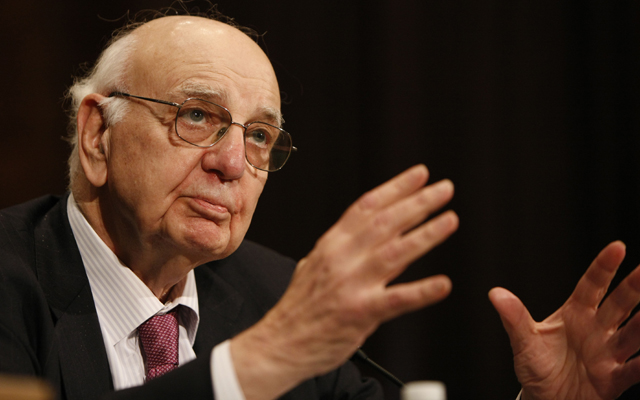Five financial regulatory agencies have completed the final rules to implement the Volcker Rule, a regulation required by the Dodd–Frank bill that is supposed to protect taxpayers by restricting banks’ financial activity.
The rule would prohibit banks from engaging in what’s known as proprietary trading—that is, making risky investments solely for their own profit. Because banks invest federally insured deposits, the newly released joint statement says that the rule will, among other things, prohibit banking entities from “engaging in short-term proprietary trading of securities, derivatives, commodity futures and options on these instruments for their own account.”
Although it sounds logical to stop banks from taking such “risky bets” with federally insured deposits, this idea ignores the basic fact that banks do make risky investments with federally insured deposits every time they make a loan. And they do so for profit so they can continue operating.
Just as important, there’s been no evidence that a Volcker Rule would have prevented—or even softened—the 2008 crisis or any previous financial crisis. Yet regulators have spent the past three years developing nearly 1,000 pages of regulatory language to implement this policy.
The final rule will have exemptions for certain activities, including “market making, underwriting, hedging, trading in certain government obligations, and organizing and offering a hedge fund or private equity fund, among others.”
Interestingly, one set of such exemptions allows banks to engage in propriety trading in “U.S. government, agency, state, and municipal obligations. They also would permit…proprietary trading in the obligations of a foreign sovereign.”
In other words, the Volcker Rule allows banks to trade for profit in virtually all government debt—even the debt and mortgage-backed securities of Fannie Mae and Freddie Mac. These are some of the very same securities that led to the recent financial crisis.
Paul Volcker is on record saying that he thinks the rule should apply to maybe four or five U.S. companies, but the rule that bears his name has gone far beyond what he envisioned. A group of House Democrats, a bipartisan coalition of Senators, and even former Representative Barney Frank (D–MA) have all said that earlier drafts of the rule—before it was as lengthy as it is now—were too complex.
There’s little doubt adding several hundred pages to the previous proposal has not added clarity for market participants, and the complexity is sure to make the Volcker Rule a subject of debate for years to come. This debate should include a full discussion of the federal deposit insurance system and how it has distorted incentives in banking. It is, after all, the fact that the federal government insures these deposits that gave us the Volcker Rule in the first place.
While the idea of limiting banks’ investment decisions sounds like a simple way to protect taxpayers from problems caused by federal deposit guarantees, doing so without limiting beneficial investment is difficult or impossible in practice. The Volcker Rule is destined to end up as many other federal regulations—ineffective and expensive for consumers.


























